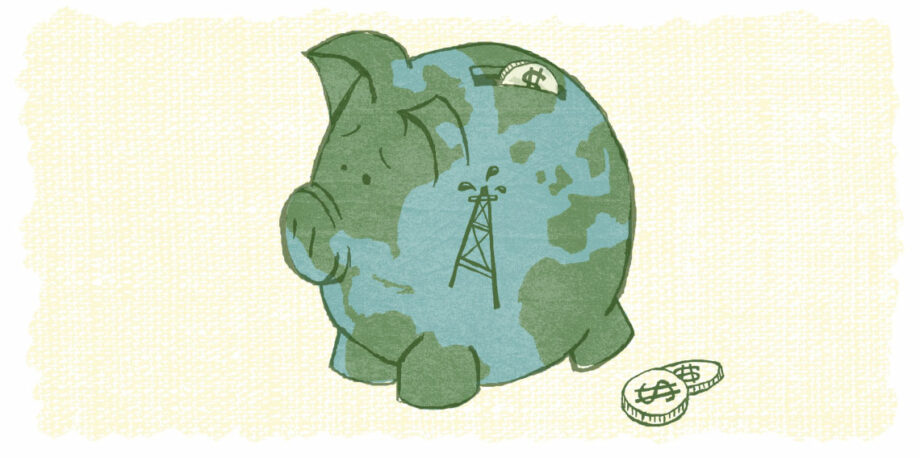January 29, 2013 — In the investing world, past performance is no guarantee of future returns. When it comes to climate science, predicting the future is more straightforward: If we burn all of the fossil fuels on the books of the big oil, coal and gas companies—2,795 gigatons, to be precise—or even most of them, we’re headed for trouble. Bill McKibben, the writer and environmental activist, calls this global warming’s terrifying new math. In response, McKibben and his allies at 350.org have launched a coast-to-coast campaign to persuade colleges, universities, churches, foundations and, yes, people like you and me, to stop investing in the fossil fuel industry.
“It does not make sense,” McKibben says, “to invest my retirement money in a company whose business plan means that there won’t be an earth to retire on.”
His logic is unassailable. But divestment alone won’t deliver the change we need—only political action can do that. And, while it is possible to cleanse your personal portfolio of fossil fuels, it’s not as easy as it sounds. Here’s why.
First, although the 350.org campaign’s divestment website recommends “environmentally and socially responsible“ mutual funds, most of them own shares of oil or natural gas companies, including those exploiting some of the world’s dirtiest oil from Canada’s Tar Sands.
Second, when investors discover a handful of diversified “deep green” mutual funds, they may be disappointed to find that their performance may vary, sometimes surpassing but other times trailing plain-vanilla index funds.
Portfolio 21 Global Equity Fund (PORTX), which manages about $387 million in assets (as of December 31, 2012), invests in “companies designing environmentally superior products, using renewable energy, and developing efficient production methods” and it screens out companies that extract and produce fossil fuels. Its biggest holdings are Google, Novo Nordisk and Roche. The fund has returned 5 percent per year over the past three years, trailing the MSCI index of global stocks, which returned 7.53 percent annually. Over the past 10 years, the fund returned 8.12 percent, edging out the index’s 8.08 percent.
It’s a similar story at The Green Century Balanced Fund (GCBLX), which is administered by a mutual fund firm started in 1991 by environmental groups. The fund, with assets of $63 million (as of December 31, 2012), holds no fossil fuel companies; its big holdings include Apple, Nordstrom and IBM. Green Century returned an average of 7.17 percent annually over the past three years, trailing the Lipper index of large balanced funds, which returned 8.06 percent. Over the past 10 years, though, it outperformed other balanced funds, earning 7.75 percent to the Lipper index’s 6.51 percent.
The risks of investing in oil and gas companies are undeniable. Increasingly, they are operating in challenging places—deep under the sea or in the Artic for oil.
Recall, though, the adage about past performance. If and when the world’s governments decide to take the problem seriously, these investments could shine.
When I asked Leslie Samuelrich, the senior vice president of Green Century Capital Management, why they screen out fossil fuels, she replied: “The overarching reason is climate change … We want to make sure we are on the solution side of that problem.” Meantime, John Streur, Portfolio 21’s president, told me “The rationale for not owning these companies is not moralistic. It’s based on our reading of the risks that are inherent in these companies.”
The risks of investing in oil and gas companies are undeniable. Increasingly, they are operating in challenging places—deep under the sea or in the Artic for oil. BP’s share price has dropped by about 25 percent since the 2010 Deepwater Horizon oil spill, while the S&P500 has gained more than 20 percent since then. Shell has spent $4 billion in the Arctic and has yet to sink a well.
Oil, coal and natural gas firms face political risks, too. Extreme weather events could spark a climate movement that could force them to leave assets in the ground. This would be good for the planet, but bad for their shareholders.
Of course, there are risks to not owning fossil fuel stocks, too. When the global economy is thriving, robust demand generally pushes oil and gas prices higher, and their stocks do well. Still, by buying other industrial companies that perform well during good times, portfolio managers can limit those risks.
Portfolio 21 and Green Century deserve credit for living up to their principles. But even if a flood of institutions and individuals follow their lead and sell their stocks in fossil fuels—which is unlikely—the Exxons and Chevrons of the world will go on burning fossil fuels. Their stock prices would fall, but so long as customers keep on buying oil and gas, they will keep on extracting and refining it. Moreover, most of the world’s oil companies are state-controlled—Saudia Arabia’s Aramco, Venezuela’s PDVSA, Brazil’s Petrobras, and the big Chinese firms. They would be unaffected by a divestment campaign.
McKibben, a smart guy, understands all this. His divestment campaign is about more than selling stocks—it’s about building a grassroots environmental movement, starting on college campuses. This month (Feb. 17), 350.org will lead a mass demonstration in Washington, aimed at pressuring President Obama to act to slow climate change, first by stopping the Keystone pipeline.
So, by all means, divest if you like. Then join the protest. Or write your congressman. Or send money to an environmental organization. Or agitate in your workplace, to get your company to take climate action. “All of the above” is not an energy policy. But it’s just what we need to take on the climate crisis.
Editor’s note: The views expressed here are those of the author and not necessarily of Ensia. We present them to further discussion around important topics. We encourage you to respond with a comment below, following our commenting guidelines, which can be found here. In addition, you might consider submitting a Voices piece of your own. See Ensia’s “Contact” page for submission guidelines.
UPDATED 02.05.13: This article originally indicated that the performance data for Portfolio 21 Global Equity Fund and The Green Century Balanced Fund were before management fees. The information is in fact inclusive of those fees, which is now reflected in the essay.
Ensia shares solutions-focused stories free of charge through our online magazine and partner media. That means audiences around the world have ready access to stories that can — and do — help them shape a better future. If you value our work, please show your support today.
Yes, I'll support Ensia!

Also, it appears the writer assumes most of us would choose dirty, destructive investments over cleaner ones with lower financial rewards. More and more of us are factoring into our investment decisions the high external costs of the planet-killing activities. Plus, we are choosing to do what is morally right, even if we forego some financial reward in the short-term. I think this is very important. We need to keep raising the bar, expecting more of ourselves, not less. We are not the selfish, greedy people economists have been telling us we are. Doing the right thing is reward enough!
Dave Gardner
Director of the documentary
GrowthBusters: Hooked on Growth
Lewis, you're correct that another way investors can help is by steering their money into renewable energy. Mosaic is an interesting new company aimed at making it easier to do just that.
Dave, I agree we should all walk and bike more and drive less but an "all of the above" energy policy implies that we need everything. I think we need to steer strongly and rapidly towards low carbon sources, including nuclear, by the way. But we have to find ways to use less coal, oil and natural gas even if that means leaving some fossil fuels in the ground.